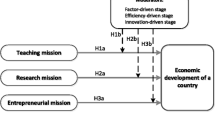Abstract
This study examines the implications of the predicted big data revolution in social sciences for the research using the Triple Helix (TH) model of innovation and knowledge creation in the context of developing and transitional economies. While big data research promises to transform the nature of social inquiry and improve the world economy by increasing the productivity and competitiveness of companies and enhancing the functioning of the public sector, it may also potentially lead to a growing divide in research capabilities between developed and developing economies. More specifically, given the uneven access to digital data and scarcity of computational resources and talent, developing countries are at disadvantage when it comes to employing data-driven, computational methods for studying the TH relations between universities, industries and governments. Scientometric analysis of the TH literature conducted in this study reveals a growing disparity between developed and developing countries in their use of innovative computational research methods. As a potential remedy, the extension of the TH model is proposed to include non-market actors as subjects of study as well as potential providers of computational resources, education and training.
Similar content being viewed by others
References
Benkler, Y. (2006). The wealth of networks: How social production transforms markets and freedom. New Haven, CT: Yale University Press.
Black, A., Mascaro, C., Gallagher, M., & Goggins, S. (2012). Twitter zombie: Architecture for capturing, socially transforming and analyzing the Twittersphere. In Proceedings of the 17th ACM international conference on Supporting Group Work (GROUP '12) (pp. 229–238).
Boyd, D., & Crawford, K. (2012). Critical questions for big data: Provocations for a cultural, technological, and scholarly phenomenon. Information, Communication, and Society, 15(5), 662–679.
Choi, S., Park, J., & Park, H. W. (2012). Using social media data to explore communication processes within South Korean online innovation communities. Scientometrics, 90(1), 43–56.
Gurstein, M. B. (2011). Open data: Empowering the empowered or effective data use for everyone? First Monday, 16(2).
International Monetary Fund. (2012). World Economic Outlook, October 2012. Retrieved from http://www.imf.org/external/pubs/ft/weo/2012/02/index.htm.
Khan, G. (2012). Social media-based systems: An emerging area of information systems research and practice. Scientometrics, 95(1), 159–180.
Khan, G., Moon, J., Park, H. W., Swar, B., & Rho, J. (2011). A socio-technical perspective on e-government issues in developing countries: A scientometrics approach. Scientometrics, 87(2), 267–286.
Khan, G. F., & Park, H. W. (2012). Editorial: Triple Helix and innovation in Asia using scientometrics, webometrics, and informetrics. Scientometrics, 90(1), 1–7.
King, G. (2011). Ensuring the data rich future of the social sciences. Science, 331, 719–721.
Lazer, D., Pentland, A., Adamic, L., Aral, S., Barabasi, A., Brewer, D., et al. (2009). Computational social science. Science, 323, 721–723.
Leydesdorff, L. (2012). The triple helix, quadruple helix, …, and an N-tuple of helices: Explanatory models for analyzing the knowledge-based economy. Journal of the Knowledge Economy, 3(1), 25–35.
Manovich, L. (2012). Trending: The promises and the challenges of big social data. In: M. K. Gold (Ed.), Debates in the digital humanities. The University of Minnesota Press. Retrieved from http://lab.softwarestudies.com/2011/04/new-article-by-lev-manovich-trending.html.
Manyika, J., Chui, M., Brown, B., Bughin, J., Dobbs, R., Roxburgh, C., & Byers, A. H. (2011). Big data: The next frontier for innovation, competition, and productivity. McKinsey Global Institute.
Park, H. W., & Leydesdorff, L. (2013). Decomposing social and semantic networks in emerging “big data” research. Journal of Informetrics, 7(3), 756–766.
Petrovic, S., Osborne, M., & Lavrenko, V. (2010). Edinburgh Twitter corpus. In Proceedings of the workshop on social media (NAACL 2010).
Williams, L. A., & Woodson, T. (2012). The future of innovation studies in less economically developed countries. Minerva, 50(2), 221–237.
Yang, Y., & Holgaard, J. E. (2012). The important role of civil society groups in eco-innovation: A triple helix perspective. Journal of Knowledge-based Innovation in China, 4(2), 132–148.
Yiu, C. (2011). The big data opportunity: Making government faster, smarter and more personal. Policy Exchange. http://policyexchange.org.uk/images/publications/the%20big%20data%20opportunity.pdf. Accessed 14 December 2012.
Zhao, X., Jiang, J., Weng, J., He, J., Lim, E. P., Yan, H., & Li, X. (2011). Comparing twitter and traditional media using topic models. In Proceedings of the 33rd European conference on information retrieval (ECIR’11).
Acknowledgments
This work was supported by the cluster funding scheme from the Wee Kim Wee School of Communication and Information, Nanyang Technological University, Singapore. I would like to thank Zhu Qinfeng for her help with the database search and analysis.
Author information
Authors and Affiliations
Corresponding author
Rights and permissions
About this article
Cite this article
Skoric, M.M. The implications of big data for developing and transitional economies: Extending the Triple Helix?. Scientometrics 99, 175–186 (2014). https://doi.org/10.1007/s11192-013-1106-5
Received:
Published:
Issue Date:
DOI: https://doi.org/10.1007/s11192-013-1106-5




